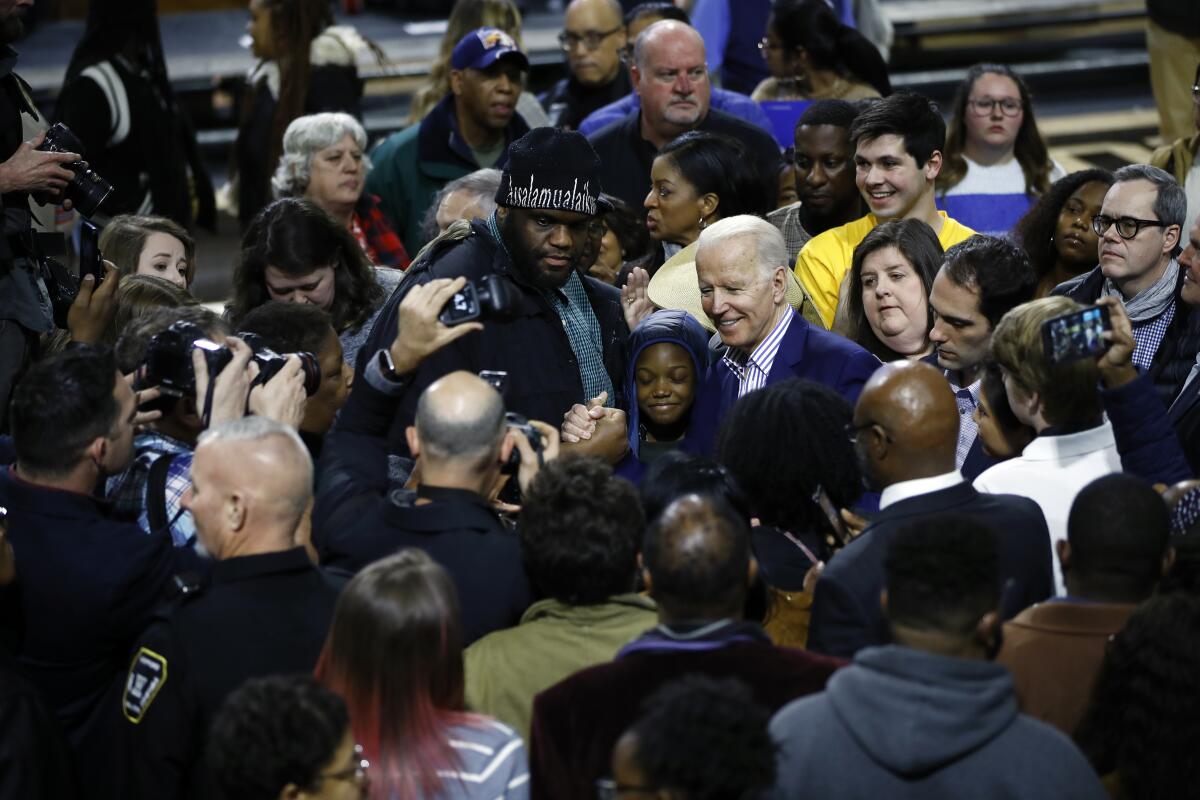Is Biden or Bernie more electable? We need more swing state polling to answer that

- Share via
Joe Biden’s strong Super Tuesday performance solidifies him as a front-runner in the Democratic primary race alongside Bernie Sanders. But winning primaries in solidly red states tells us very little about whether he can ultimately garner the necessary majority in the electoral college and win the presidency.
Many Democratic primary voters say their single most important issue is finding the candidate with the best chance of defeating President Trump. And the Democratic National Committee hasn’t done enough to give voters good electability information.
To decide who’s electable, we need more current head-to-head polls asking likely voters in swing states whom they would vote for in a general election if the choice was, say, either between Trump and Sanders, or between Trump and Biden. Available head-to-head polling data shows Biden has the best odds of beating Trump, but we need fresher state polling to find out what likely voters currently think.
National polls don’t indicate whether candidates will win competitive states or just rack up votes in safely blue or red regions. Both Sanders and Biden outpoll Hillary Clinton’s vote share by 6% to 10% in head-to-head polling in Kentucky and Tennessee. But these states are so solidly Republican that their relative success would not be enough to win those states’ electoral college votes.
To take back the White House in November, the eventual Democratic nominee will need to win the popular vote within enough states to garner 270 electoral votes. The key to Democrats’ electability is flipping competitive states that voted for Trump in 2016, such as Wisconsin and Pennsylvania, without losing states that Clinton narrowly won, such as New Hampshire.
Our analysis of the 105 head-to-head polls that have been conducted in 26 states since the beginning of 2019 suggests Biden is more electable than Sanders, which is essentially what the race has come down to.
These polls suggest that Biden would beat Trump “like a drum,” as the former vice president has said, since Biden is forecast to flip 106 electoral votes from red to blue — far more than the 38 extra votes that Democrats needed to win in 2016. Sanders is also ahead of Trump in our polling analysis and is forecast to flip 84 electoral votes.
Our estimates improve upon electability arguments that rely upon national polls, cherry-picked state polls, and statements about increased voter turnout that aren’t backed by data. Still, our projections rely upon too many stale polls. We weighted newer polls more heavily in our analysis, but in some states that will be competitive in the general election, such as North Carolina and Minnesota, head-to-head polling hadn’t occurred in the last three months.
Last summer, before the primary race was well underway, head-to-head polling was rightly maligned because it mainly reflected how well the candidates were already known — those with name recognition polled higher. But now the field has narrowed and the remaining candidates are household names.
With 37% of the pledged Democratic delegates now accounted for after Super Tuesday, primary voters in the remaining states have to decide whether Sanders or Biden should go on to face off against Trump. To guide these voters, head-to-head polling in competitive states is the clearest way to determine who can put together enough electoral votes to win in November.
Our analysis shows that Sanders and Biden each should be able to turn enough states blue to win the presidency — so Democratic voters might feel liberated to vote for the candidate whose policies most closely align with their preferences. But risk-averse voters might rightfully worry about whether Trump will again outperform the polls and come out on top in November.
In the states Trump unexpectedly won (Florida, North Carolina, Wisconsin, Pennsylvania and Michigan), his popular vote margin beat the polls by an average of about 4%.
Democratic voters who are nervous about the possibility of a repeat of 2016’s polling failures might consider supporting Biden as the party nominee because he has the largest electoral college lead in a matchup with Trump. This gives Biden the biggest buffer against polling error. Trump would need to outperform the head-to-head polls by almost 6% in competitive states to win an electoral college majority in a race against Biden. In comparison, Sanders would lose the electoral college if Trump somehow beats his polling results in competitive states by 3.8%.
Again, these results are limited by the paucity of recent polling. Voters, particularly those in noncompetitive states, deserve better information about which candidates have the best chance of flipping the battleground states. Democrats in solidly blue or red states can make their primary votes count by selecting a nominee who stands a better chance of winning battleground states come the general election.
The Democratic National Committee has used polling results as one criterion for determining which candidates qualify for the televised debates. In the two most recent debates, candidates had to garner at least 10% in DNC-approved national polls or 12% in state polls conducted in Nevada and South Carolina. These polling requirements are one way of limiting the pool to the most viable candidates. But now that the nomination race is turning into a Biden-Sanders showdown, the party should make it a priority to provide voters with information on which candidate is most likely to win the White House.
As we careen toward November, both the DNC and news organizations have a role to play by sponsoring more head-to-head state-level polls. Armed with this additional information, “blue no matter who” Democrats can have their say in whether Sanders or Biden faces off with Trump.
Ian Ayres is a professor and Zachary Shelley is a research fellow at Yale Law School.
More to Read
A cure for the common opinion
Get thought-provoking perspectives with our weekly newsletter.
You may occasionally receive promotional content from the Los Angeles Times.









